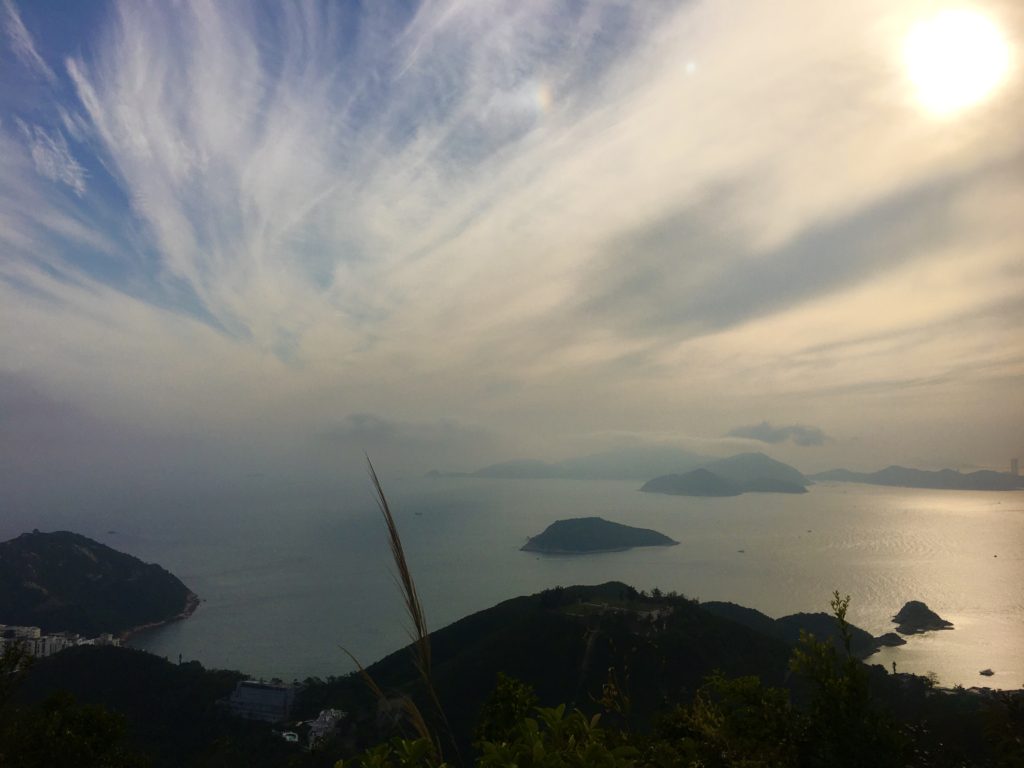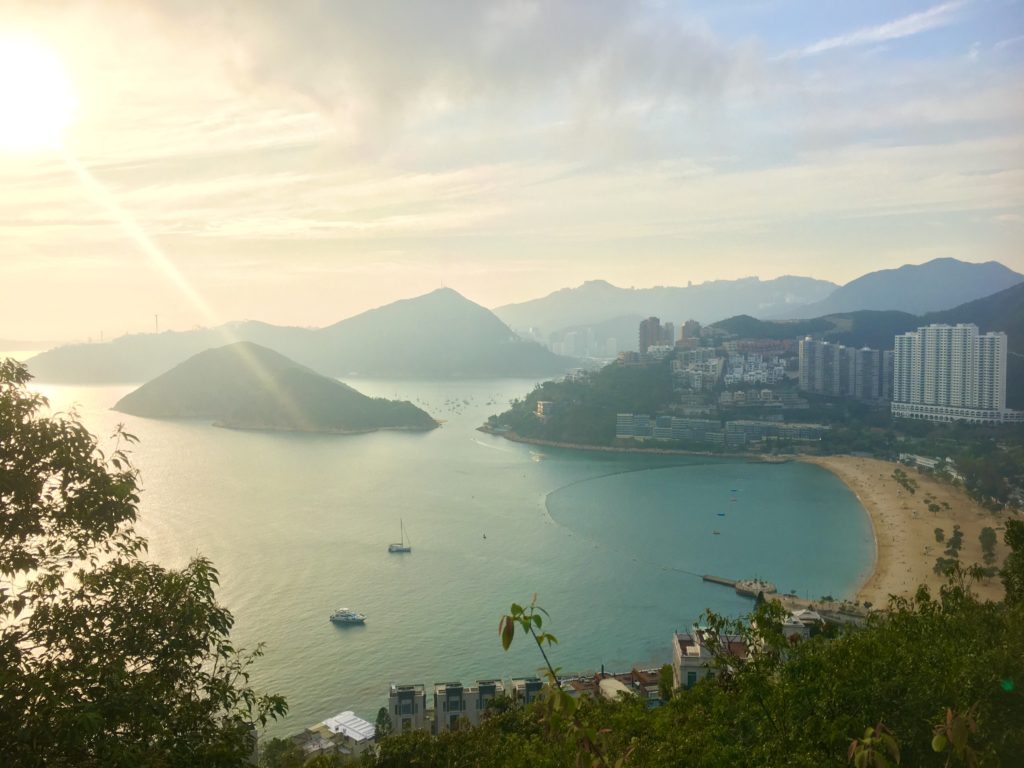
By Andrea Stout | Instagram: @stoutwanderer
Stop me if you’ve heard this one before: a group of travelers finds themselves stranded, due to one disaster or another, on a tropical island, let’s just say somewhere in the Pacific Ocean. The question now, for the rest of this movie or TV series, is how will they survive, and, ultimately, will they make it home?
Yeah, I know, I’ve seen it, too. Feels a bit tired, doesn’t it? As a writer, and a professor of writing and storytelling, I fervently preach against predictable plot points and clichéd characters. “Avoid the tropes!” I might have admonished my students, when I still had a class to go to. But now, as an American expat living (or “stranded”) in Hong Kong during this current pandemic, tropes and clichéd characters seem all but impossible to avoid.
Superficially, everyone appears to be fulfilling the role set out for them in the script. Of course, nature is the villain in this one, so that’s easy—a tried and true antagonist. If it’s not aliens (said with no judgment aimed at my alien conspiracy theorist friends) or zombies, a virus works just as well as anything: a comet, an immediate global freeze, a cataclysmic seismic something rather involving shifting tectonic plates … as long as a scientist can explain it to us laypeople in a thirty second scene with some maps and cool graphics, we don’t really care.
Next, we need some human representatives of ideological differences voiced through political infighting: “We need to get these people out of here!” “Are you crazy?! All that will do is cause panic!” “It’s too late for them! We need to seal the borders now!” “We can’t firebomb that town! Human life is too precious!” Personally, I like to hear Morgan Freeman’s voice narrating the case for humanity, but … we have who we have, and they’re all acting their parts as best they can.
Moving on, crucially, we need the protagonist, followed by a cast of all the other personality types: the anxious one, the gruff one, the funny one, the hapless one, etc. Like I said, I study stories for a living, and I see why we like this kind of tale. It’s got everything we like: drama, action, suspense, all that we fear and all that we want to believe about the human spirit. And, naturally, we are all the protagonists in our own stories, so we identify and rejoice at the happy ending. Heroes all!
Having said that, I recognize that this is not fiction. And maybe that’s what is most frustrating me: I don’t know how to write it. Or, I should say, I don’t know how to write it without falling into tropes. Everything I might write feels clichéd: responses by governments, businesses, media outlets, our varied cast of characters, the conflicted protagonist … we’ve seen it all before.

If it were fiction, I could change it, like a writer changing history to make it more like how we would have liked it to be, or at least to cut out the boring parts. Instead, we have a plot that’s painfully dragging. Sure, some parts are fairly dramatic.
Hong Kong, for example, has had quite the year. We had the whole “protest thing,” starting spring of 2019, which I won’t go into but suffice it to say drastically and fundamentally impacted our daily lives here in this “special administrative region” and lasted into January of 2020, coming to no resolution but instead being unceremoniously usurped by what was then called “the novel coronavirus.”
We had already become acclimated to school and business closures, as well as event and trip cancelations, throughout the fall (our school term ended with finals having to be hastily conducted online) and tension between Hong Kong and mainland China was already palpable, so the only difference between the virus shut-down and the protests shut-down for most of us was that instead of “watch this space for daily announcements about closures,” we now had “school will be conducted virtually for the remainder of the term.”
In the West, the effects of the virus became a bigger story later (a topic for another time), but in Hong Kong, this has been the story since the end of January. Many expats began to read the writing on the wall, so to speak, or were simply too exhausted or too out of work to continue on here and began the exodus in February and continued on into March.

Now, it’s important to remind you, reader, that this is my story and I’m the protagonist here—this means you’re meant to be on my side. I could spend time trying to convince you with likeable and reasonable arguments for my decision to remain—most of it involving the fact that I had already decided this was to be my final year in my current position and I was making arrangements to move elsewhere to start at a new institution come fall and so wanted to finish out the term in Hong Kong and leave at the end of April—but, for the sake of brevity, I’ll just describe my decision this way: as my colleagues and friends began their similarly understandable and well-reasoned escapes, I did what seemed fitting for my character.
My role, which I accept, is to stay calm. I get things done, take things in stride, respond with logic, action, and, at times, humor … it’s the role I was born to play (putting aside conversations of nature vs. nurture). So, when my April 27th flight was canceled on April 2nd, I absolutely did not panic. Instead, I cried. I cried because, like all of us, I’m tired. I’m tired of cancelations, unrealized visits by friends and family, refunded play and festival tickets, month after month of online work/church/socializing/life, which feels like only partial living, and I’m tired of not knowing the ending and not even knowing when we will get the ending. It feels like being part of a TV series whose writers have abandoned the project midway through or have been told to put the writing on hold, and now it’s just dragging on with filler subplots, no end in sight.
I’m tired of not knowing the ending and not even knowing when we will get the ending. -Andrea Stout Click To TweetA brief aside here: In storytelling, there’s a common plot device called deus ex machina. It’s a Latin term, used in Greek theatre, meaning “god from the machine.” The gist of it is that, when characters find themselves in an unsolvable situation, they can be rescued suddenly by some outside force, like the hand of God reaching in, via ancient Greek set design and machinery, and hoisting them out. Commonly referred to examples now would be The Lord of the Rings eagles soaring in inexplicably to save the day or the Jurassic Park T-Rex crashing in from nowhere to chomp the other dinosaur that was imminently threatening our protagonists.
The idea is that help can always come, inexplicably or supernaturally, from above. It’s actually a nice idea, but nowadays, deus ex machina is considered by many in the industry to be “lazy writing.” The protagonist should save herself, be proactive and resourceful. Think Sigourney Weaver’s character, Ripley, in Aliens: yes, a machine is used defeat the seemingly undefeatable alien, but it’s not God in the machine—it’s Ripley. She knows how to control it, and she is the agent of her own victory.
Returning to our story, I will once again say that I’d be much more comfortable if this were fiction. I could give my protagonist an ability to fly planes or access to high-tech gadgetry, friends in the Pentagon (or Stark Tower), a magic lasso, unlimited resources, or, at least, stellar martial arts or warrior moves à la Catwoman or Wonder Woman. But as it is, this being nonfiction, I’m not sure what proactive measures I can write in for my character.

Waiting feels decidedly non-heroic, and waiting for “the hand of God” to swoop in and rescue me, despite my own personal faith that this is possible, still feels a bit like lazy writing on my part. But I guess that’s where I have to leave it. As far as cliffhangers go, this isn’t much of one—the protagonist is left safe on an island, packing boxes, reading, going for hikes, and checking emails for updates on flight statuses.
Will she get off the island come May, or will it be June? Only Deus knows. And hey, maybe I’m not the protagonist, after all. Maybe I’m the hapless one—the hapless writer, hanging out in the writers’ room, waiting for the go-ahead to write the ending. Until then, I’ll just be here, hoping the series doesn’t get canceled and reconsidering my thoughts on heroes and machines, eagles and aliens.
About Andrea:

Andrea Stout is a teacher, writer, and storyteller. She currently lives and works in Hong Kong. Follow her on Instagram.
Photos by Andrea Stout, used by permission.
